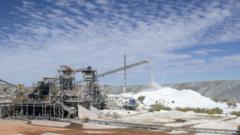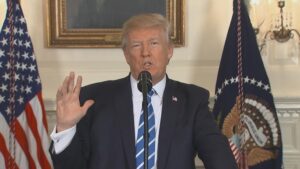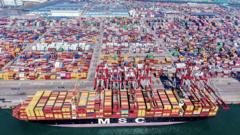In the wake of China's decision to halt rare earth exports, Australia's Prime Minister Anthony Albanese is positioning the country as a potential alternative supplier in the global market for critical minerals. His recent pledge to invest A$1.2 billion in a strategic reserve comes as trade tensions rise, particularly with the United States, which relies heavily on these minerals for advanced technology production.
Australia's Critical Mineral Ambitions Rise Amid China's Export Curb

Australia's Critical Mineral Ambitions Rise Amid China's Export Curb
Australia aims to diversify rare earth supply amid China's export restrictions on essential elements.
China's recent curtailment of exports on seven rare earth elements — vital for electric vehicles, military applications, and cutting-edge innovations — has raised alarms across the globe. These minerals, which include elements like samarium and terbium, are notoriously challenging to extract and refine, with China handling over 90% of their refinement, positioning it monopolistically in the market.
Australia, home to substantial deposits of rare earths, lithium, and cobalt, aims to bolster its role as a supplier for its partners, including the US and the EU. However, experts caution that even with increased stockpiling, the country remains reliant on China for refining these materials. This dependency raises questions about the effectiveness of Albania's proposed reserve, which is seen as a long-overdue response to the strategic vulnerability felt by Western governments.
While Australia is making strides by opening its own processing facilities, including a combined mine and refinery operated by Arafura Rare Earths, it will not be able to wholly mitigate reliance on Chinese refinement until at least 2026. This suggests that while plans may be ambitious, realignment in the global supply chain will take time.
Beijing's export curbs are viewed as a retaliation against US tariffs instituted under former President Trump. With alternative partnerships taking shape, analysts emphasize the need for Australia to solidify its position without overestimating its newfound capabilities, as continued engagement with China remains integral to the global market.
Some experts assert that Albanese's proposal could shift global dynamics regarding rare earth pricing by giving Australia leverage to sell reserves during periods of economic tension; however, the refinement centralization in China still poses challenges. The steps taken by Australia, while providing options for Western allies, illustrate that shifts in the complex landscape of critical mineral supply chains will require substantial strategic and infrastructural developments.
Overall, as Australia seeks to fortify its role in critical mineral supply, the road ahead remains intricate, woven with China's looming presence and the urgent need for global collaboration and innovation.
Australia, home to substantial deposits of rare earths, lithium, and cobalt, aims to bolster its role as a supplier for its partners, including the US and the EU. However, experts caution that even with increased stockpiling, the country remains reliant on China for refining these materials. This dependency raises questions about the effectiveness of Albania's proposed reserve, which is seen as a long-overdue response to the strategic vulnerability felt by Western governments.
While Australia is making strides by opening its own processing facilities, including a combined mine and refinery operated by Arafura Rare Earths, it will not be able to wholly mitigate reliance on Chinese refinement until at least 2026. This suggests that while plans may be ambitious, realignment in the global supply chain will take time.
Beijing's export curbs are viewed as a retaliation against US tariffs instituted under former President Trump. With alternative partnerships taking shape, analysts emphasize the need for Australia to solidify its position without overestimating its newfound capabilities, as continued engagement with China remains integral to the global market.
Some experts assert that Albanese's proposal could shift global dynamics regarding rare earth pricing by giving Australia leverage to sell reserves during periods of economic tension; however, the refinement centralization in China still poses challenges. The steps taken by Australia, while providing options for Western allies, illustrate that shifts in the complex landscape of critical mineral supply chains will require substantial strategic and infrastructural developments.
Overall, as Australia seeks to fortify its role in critical mineral supply, the road ahead remains intricate, woven with China's looming presence and the urgent need for global collaboration and innovation.


















